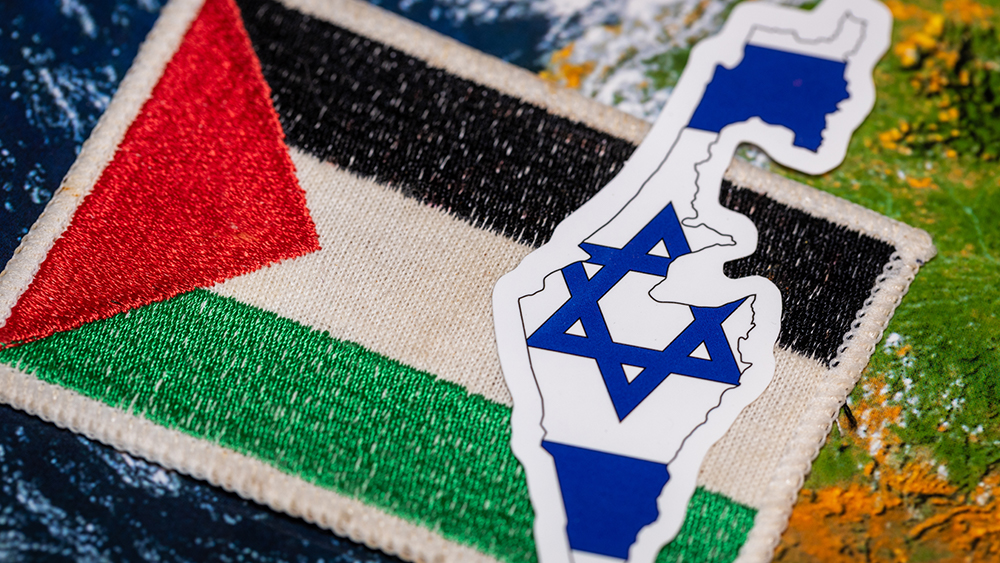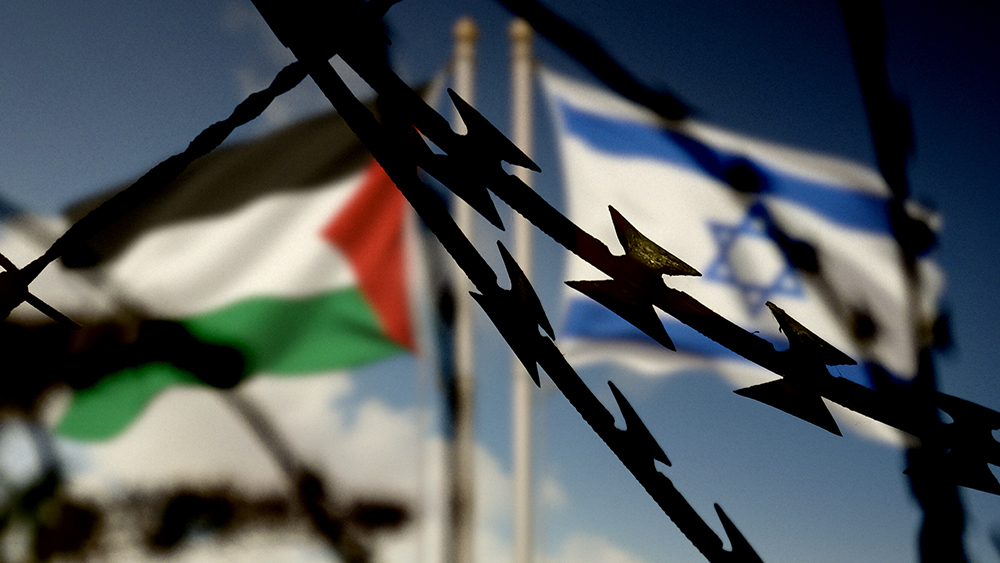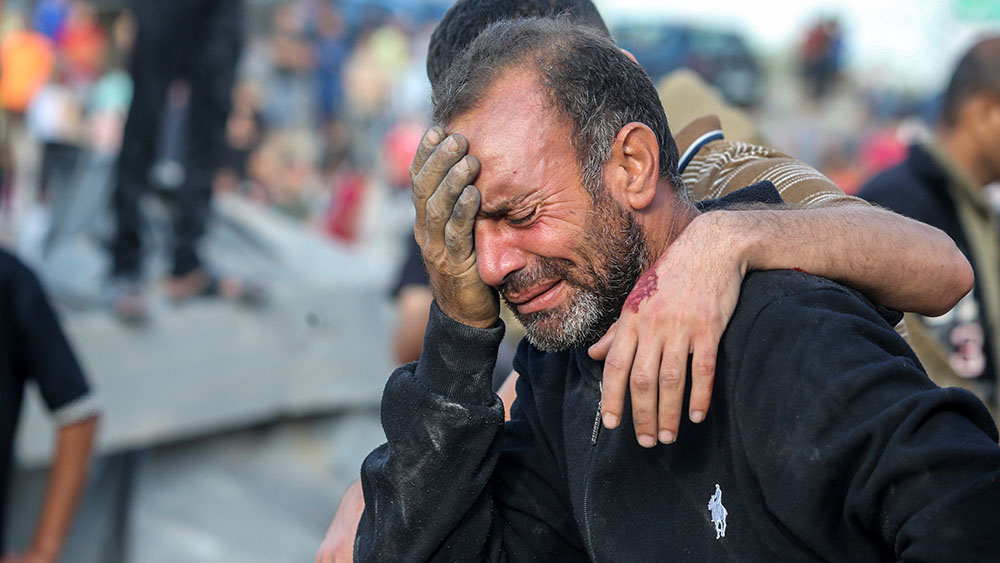 Parler
Parler Gab
Gab
Be informed
Keep well-informed by the news on TV, radio or online media on what the country's involvement is, what weapons (conventional, biological, nuclear, etc.) are being used, how close attacks are happening and so on. Use the information to draw an actionable prepping plan.Prepare and build your stockpile
Feel free to add what is not on this shortlist using what you've learned from your experience and those of others who have survived.- Food – Budget permitting, keep stockpiling extras of food items that you and your family eat that will meet everyone's caloric requirements, such as non-perishable foods, foods that require little or no cooking, must-have shelf-stable foods, storable staple foods, special "survival" foods and so on. (Related: How to keep food on the table during GLOBAL famine.)
- Water – Determine your basic water needs by making a list of each household member's daily water requirements (including your pets) – to stay hydrated and do your oral and personal hygiene. Add supplemental water requirements to your list – to cook your food, wash your clothes and other personal items, clean your home, water your garden plants and so on. (Related: Does water expire? A basic guide to storing tap water for survival.)
- Storage containers – Space permitting, stock up on canning bottles, food-grade buckets, Mylar bags and pouches, portable water bricks and so forth. (Related: Food storage tips: How to turn a trash can into a root cellar.)
- Medicine and medical supplies and equipment – It is important to take the time to review your medical kits to ensure that they are up to date and contain all the necessary items for the current situation (and beyond).
- Tools – survival knives and sharpening tools; manual tools for the kitchen; gardening, home repair, plumbing, emergency rescue (ax, bolt cutters, crowbar, pliers, screwdrivers, sledgehammer, wrenches and so on). (Related: 10 Things that will still work after an electromagnetic pulse attack.)
- Gear and equipment – communication (hand-crank radio); clothing and footwear (for all seasons); personal protective paraphernalia (dust and gas masks); bug-out bags; tarps; practical weapons for self-defense; fire-starting supplies; cordage and other go-to survival tools. (Related: UHMWPE braided cord: An amazing survival tool when SHTF.)
- Alternative power sources – In any SHTF emergency, power supply is almost always one of the first casualties so start adding reliable sources of emergency power that you can depend on. (Related: Are you ready when the lights go out? Rare solar storm could fry power grids, warns British physicist.)
Fortify your shelter
Learn simple strategies you can implement now to significantly improve your home security. (Related: Prepper project: Bulletproofing greatly improves your home defense.)Learn basic survival skills
The following is just a sample of some worthy survival skills you and your family members might want to learn and master. (Related: 10 survival skills to learn and practice at home.)- Physical fitness – Your preparation should involve making sure you are healthy, physically fit, strong and mentally prepared when things go south. (Related: Do these exercises in the morning to boost your heart health.)
- Garden growing for food and medicine – The only way you can ensure your future survival is to grow your own food (and medicine) and extend your stockpile because your food stash will eventually run out. (Related: Growing your own food: Gardening resources for beginners, intermediate and advanced gardeners.)
- Raising poultry and livestock for food and barter – If you're worried about food security, raise chickens if you have a small backyard. They could be your family's source of fresh protein daily or maybe provide you with income. (Related: 9 ways to feed your chickens for FREE.)
- Water purification methods – In a SHTF situation, sanitation will become an issue, you will need something that can filter out contaminants in your water that may cause you or your household to become ill. (Related: Water safety: Preserve water using silver coins.)
- Food preservation – Knowing various methods that can help increase your food supply and reduce food waste. (Related: Food preservation techniques used by different cultures around the world.)
- Home remedies and emergency medical response and care – injuries, illnesses and medical emergencies can occur, especially during SHTF scenarios. Access to professional medical care may be limited and pharmacies may be unavailable. (Related: Natural remedies: How to make herbal salves and herbal infusions at home.)
- Building a shelter and home repair – These are important critical survival skills that you can also use to barter for things that you may need. (Related: Survival skills: Tips for building an improvised fallout shelter.)
- Foraging, including fishing and hunting – These skills will help bring variety to your food stockpile, extend your food supply or re-stock your thinning stash. (Related: Tips for responsibly and safety foraging and hunting for food.)
- Self-defense – learn why self-defense is a "divine right." (Related: Self-defense is a 'Divine Right' says Mike Adams in new video documentary.)
Prepare financially
In the old days, people used the "cookie jar" method, which allowed them to manage their expenses by saving and allocating money in different containers for separate purposes, such as rent, utilities, groceries, tuition, entertainment and so on. (Related: Financial preparedness: Tips for quickly building an emergency fund with a low income.)Prepare your family
If you have a family, involve every member in your survival preparedness plans so that you won't be the only one who knows what to do. (Related: Basic survival and prepping skills that your kids should learn ASAP.)Understand the importance of community
Engage with and foster a community of like-minded individuals to create a strong support network during challenging times. Don't fall into the trap of isolating yourself and your family in the guise of self-reliance. Visit Preparedness.news for more stories like this. Watch this video about seven practical ways to prepare for WWIII. This video is from the Daily Videos channel on Brighteon.com.More related stories:
Prepping for collapse, famine and nuclear war: 12 Tips that will help you be more resilient when SHTF. Basic outdoor survival skills that will help you when SHTF. 8 Forgotten skills that helped the Native Americans survive harsh times. 20 Wilderness survival tips that might save your life after SHTF. Staying under the radar: Tips for efficient stealth prepping. Sources include: PreppersWill.com AskAPrepper.com TheRealSurvivalist.com OffgridSurvival.com Pickled-Pepper.com PrimalSurvivor.com PrepForceOne.com Survivopedia.com ModernSurvivalOnline.com Brighteon.comNetanyahu: Israel to take over “security” in Gaza after the Israel-Hamas war
By Laura Harris // Share
Zelensky “deludes” himself into thinking Ukraine can win the war, aide says
By Ethan Huff // Share
Governments continue to obscure COVID-19 vaccine data amid rising concerns over excess deaths
By patricklewis // Share
Tech giant Microsoft backs EXTINCTION with its support of carbon capture programs
By ramontomeydw // Share
Germany to resume arms exports to Israel despite repeated ceasefire violations
By isabelle // Share










